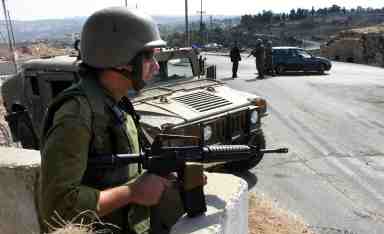
NOVEMBER 2005
|
||
| Israeli occupation soldiers blocking a main road between Ramallah and neighboring village at Attarah checkpoint yesterday, as a collective punishment of the Palestinian people (Assafir, 10/19/05) | ||
Chris McGreal in Jerusalem
Tuesday October 18, 2005
The Guardian
At the northern edge of Jerusalem, on the main road to the Palestinian city of Ramallah, three towering concrete walls are converging around a rapidly built maze of cages, turnstiles and bomb-proof rooms.
When construction at Qalandiya is completed in the coming weeks, the remaining gaps in the 8m (26ft)-high walls will close and those still permitted to travel between the two cities will be channelled through a warren of identity and security checks reminiscent of an international frontier. The Israeli military built the crossing without fanfare over recent months, along with other similar posts along the length of the vast new "security barrier" that is enveloping Jerusalem, while the world's attention was focussed on the Israeli prime minister, Ariel Sharon's removal of Jewish settlers from the Gaza Strip.
But these de facto border posts are just one element in a web of construction evidently intended to redraw Israel's borders deep inside the Palestinian territories and secure all of Jerusalem as Israel's capital, and to do it fast so as to put the whole issue beyond negotiation. As foreign leaders, including Tony Blair, praised Mr Sharon for his "courage" in pulling out of Gaza last month, Israel was accelerating construction of the West Bank barrier, expropriating more land in the West Bank than it was surrendering in Gaza, and building thousands of new homes in Jewish settlements.
"It's a trade off: the Gaza Strip for the settlement blocks; the Gaza Strip for Palestinian land; the Gaza Strip for unilaterally imposing borders," said Dror Etkes, director of the Israeli organisation Settlement Watch. "They don't know how long they've got. That's why they're building like maniacs."
Arad: “Israel may
annex the West Bank”
Saed Bannoura - IMEMC & Agencies - Wednesday,
28 September 2005
Eyad Arad, a senior strategy advisor of the Israeli Prime Minister Ariel Sharon, said on Wednesday that Israel may consider annexing the West Bank if the diplomatic impasse with the Palestinians continues.
“Israel may consider using unilateral disengagement as a government policy”, Arad said, “This includes annexing the West Bank territory and withdrawing to what the Jewish state would decide as its permanent borders”.
Arad added that if the stand still in the peace talks
with the Palestinians continue “there may be room to
consider using unilateral disengagement as a
policy”. The unilateral strategy according to Arad
includes determining the permanent borders of Israel.
“The importance of this step is not withdrawal to,
and what areas we will hold on”, he said, “The
importance is the annexation of areas we will not
evacuate”.
Palestine
Final Status map planned by Israel Govt.:
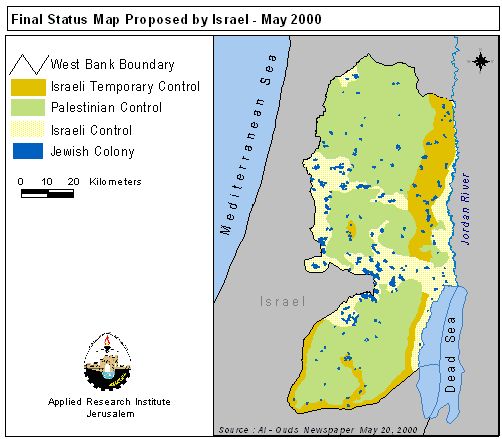
PLEASE NOTE THE PLAN TO DEPRIVE PALESTINIANS OF THE
FERTILE JORDAN VALLEY THAT THIS MAGAZINE (HANDSTAND) HAS
BEEN REVEALING IN THE PIPE LINE FOR SOME TIME.
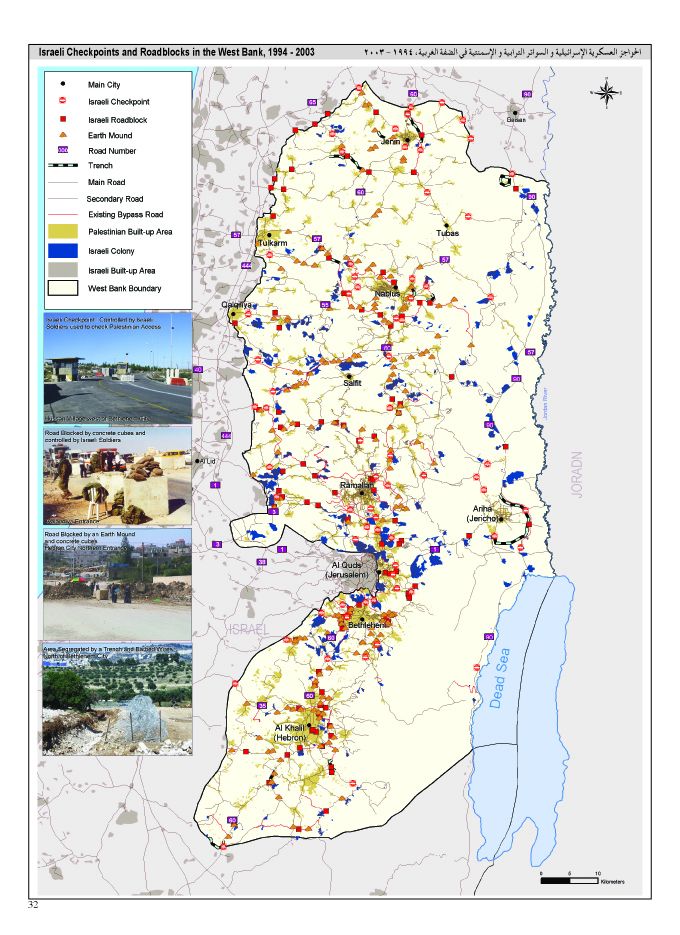
Songs, Scraps & Scrapes
Joined by Israeli activists and internationals
activists from the International Solidarity Movement,
Bil'in villagers plan to march to the wall site with a
giant Palestinian flag personified with people's heads.
In the middle of the flag will be a mock barrier,
demonstrating how Israel's wall is dividing Palestine.
The Israeli soldiers who will be present to repress the
demonstration, will be made to appear as if they are
holding up the mock barrier.
Bil'in lies five kilometers East of the Green Line.
Israel's planned wall route cuts deep into the West Bank,
annexing large sections of Palestinian land to Israel and
separating Palestinians from eachother. If completed,
Israel will annex 60% of Bil'in's agricultural land to
Modi'in Elite settlement, the expansion for which has not
yet been officially approved by the Israeli government. anarchist@riseup.net
Israeli soldiers distributed a text in Arabic warning
people not to take part in direct action against the
wall, which they consider to be "violence against
security property." The text claimed that
"every Friday for the last six months, the IDF has
allowed the people of the village to conduct non-violent
protests against the construction of
the wall on their lands," despite regularly
arresting and beating demonstrators and firing on them
with tear gas and rubber coated metal bullets. The
leaflet concluded with the threat that "the acts of
the people who are violating the law will disturb your
daily lives."
For the last ten months, Bil'in has launched an ongoing
non-violent campaign against the annexation barrier
supported by hundreds of Israeli and international
activists. It has been met with brutally violent Israeli
repression. Israel designed the current route of the
barrier to annex 60% of Bil'in's agricultural land to
Israel, and
expand the settlement of Modi'in Elite. Plans for Modi'in
Elite's expansion have yet to be approved by the Israeli
government.
Neta Golan
Anti-Wall Demonstration in Bil'in
By Joe Carr Also see update below as Joe Carr has now been wounded and is in hospital
from
Neta Golan
Friday,
September 16, 2005
Read this report with pictures at www.lovinrevolution.org

Israel is planning to use its Apartheid wall to annex around half of the farmland belonging to Bil'in, a Palestinian village in the central West Bank. In resistance to this gross injustice, Bil'in villagers have held weekly popular demonstrations on the site of the planned wall's construction, and they often manage to interrupt the work. Despite the clearly nonviolent nature of the demonstrations, the Israeli military has responded with an increasing level of violent repression including teargas, concussion grenades, beatings, mass arrest, rubber-coated bullets, and even live gunfire.
The Israeli military is instructed to use less violence when Israelis and internationals are present, But standing alongside Palestinians, hundreds of Israeli and international activists have been gassed, beaten, arrested, and even hospitalized from Israeli military violence.
The demonstrations are organized by Bil'in's Popular Committee against the Wall, who are increasingly creative and confrontational in their acts of nonviolent direct action against the wall. For the last nine months, they've held a mass demo every Friday (the Muslim holy day) which have included praying, puppets, mock walls, and music.
Famous pianist Jacob Allegro Wegloop is
a Jewish Holocaust survivor from Holland. His plane
landed in Tel Aviv at 5am and he came directly to Bil'in
to perform at the weekly demonstration.(photos in October
Issue of the Handstand, JB,editor)
David Rovics ( www.davidrovics.com), a rather popular political folk
singer made an appearance at the protest as part of his Palestine
tour. Amplified by loudspeakers on a roof, Joseph
accompanied a group of Palestinian children singing Palestine's
national anthem, and then played some classical pieces.
David sung about the wall, the war in Iraq, and the
situation in Palestine generally. I was supposed to
perform as well, but the show got repeatedly interrupted
by passing soldiers and rumors of violence.
After the noon-day prayers, the march began out to the wall site. A thick line of Israeli soldiers in riot gear with a string of razor wire were waiting for us about 200 meters before the destruction zone, and a confrontation ensued. There were dozens of journalists present because of these big-named internationals and because of a recent court case that ended in the unconditional release of one of the main Palestinian organizers with Bil'in's Popular Committee. Because of the media and an Israeli judge's harsh criticism of the military, there was less violence at this demonstration. However, the military was far from peaceful. Groups of demonstrators repeatedly tried to go around the blockade and march onto Palestinian land, but Israeli soldiers pushed and beat them with batons. In order to keep Palestinians from being arrested, we internationals and Israelis stayed close to those making these challenges, and were hit and pushed along with them. Several times I was knocked down onto rocks and cacti; I'm still finding thorns in my legs. After about a half an hour, one of the organizers led a group quickly up a hill and around the soldiers. The soldiers moved fast to head us off, but not before the Palestinian organizer and two internationals had made it down onto a field. The rest of us were unable to get down there immediately and the soldiers began pushing and hitting the three of them, and the internationals tried to protect the Palestinian from violence and arrest by holding onto him. The soldiers managed to separate the Palestinian from the internationals, but not the internationals, two British brothers, from eachother. We've learned that sometimes one can avoid arrest by refusing to cooperate and making things difficult, and difficult it was. About eight soldiers hit and dragged on the two trying to separate and handcuff them, but had much trouble.
Once soldiers separated them, two other internationals and I decided we'd make an attempt to "de-arrest" one of them by grabbing his feat and removing him from the soldiers grasp (this tactic has been repeatedly successful here and in the US). However, since there were only three of us, several other soldiers pounced on us and tried to grab us. After about 20 minutes of vicious struggle, the two internationals were each carried by away four soldiers. To keep me from following, two other soldiers pushed and shoved me against some rocks ordering me to climb up and out of the field. I resisted for awhile but eventually relented rather than be stuck too long in the stalemate. As I ran back, I noticed two soldiers leading the Palestinian who'd been taken. I quickly moved over and grabbed his shoulders, making it clear they weren't taking him without taking me. Another international stayed in front of him with the same intention. Soldiers surrounded us and negotiations began. After making an eloquent speech in Hebrew about his right to nonviolently protest on his own land, the Palestinian was released and we all cheered in victory. Meanwhile, one of the international arrestees had taken off running when his soldier guard was busy flirting with an Israeli journalist. He escaped, but his brother was quickly thrown into a jeep.
The British arrestee was released that evening after finally giving his name. He and his brother were quite bruised and scraped up, but the Palestinian was free and there were no serious injuries.
The Israeli military set up specific checkpoints to catch Israelis trying to attend the demo, and two busloads were detained and escorted back to Tel Aviv. One van made it in later, just as the official demo had ended and confrontations began between Palestinian rock-throwers and heavily armed Israeli soldiers. With slingshots and well-trained arms, Palestinian youth rained stones onto this illegal occupying army, who responded with tear-gas, concussion grenades, and rubber-coated bullets. Seven were injured by gas and bullets including a journalist, two children, and two elderly people.
The path of Israel 's annexation barrier is currently under dispute in Israeli courts. We hope that these demonstrations will help push the courts to change the current plan which would nearly surround Bil'in, however we don't trust the Israeli system to ever met out justice. Meanwhile, Palestinians will continue to resist and we will continue to accompany them, no amount of violence will silence our collective voice.
Closed Military Neighborhood -
Internationals challenge Israeli repression in Tel
Rumeida
Written By Joe Carr
10 September 2005
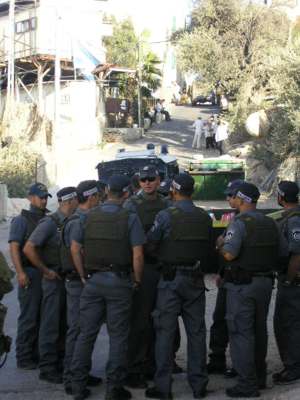 Due
to the effectiveness of our work in Tel Rumeida, the
Israeli military and police have increased their efforts
to rid the area of internationals. Volunteers from a
variety of international organizations have been doing
full-time accompaniment, documentation and physical
intervention work to deter constant settler violence in
Tel Rumeida, a Hebron neighborhood colonized by around
sixty of the most fanatic Israeli settlers. Volunteers
from the Tel Rumeida Project ( www.telrumeidaproject.org) and the International Solidarity
Movement ( www.palsolidarity.org) have been especially targeted for
violence by settlers, and harassment by Israeli military
and police.
Due
to the effectiveness of our work in Tel Rumeida, the
Israeli military and police have increased their efforts
to rid the area of internationals. Volunteers from a
variety of international organizations have been doing
full-time accompaniment, documentation and physical
intervention work to deter constant settler violence in
Tel Rumeida, a Hebron neighborhood colonized by around
sixty of the most fanatic Israeli settlers. Volunteers
from the Tel Rumeida Project ( www.telrumeidaproject.org) and the International Solidarity
Movement ( www.palsolidarity.org) have been especially targeted for
violence by settlers, and harassment by Israeli military
and police.
Last night, Israeli Police detained four international
volunteers while they were documenting and intervening in
Israeli settler attacks on Palestinians. At the Kiryat
Arba Settlement police station, officers said that they
weren't arresting the internationals, but wanted to make
it clear that they would not allow internationals to live
in Tel Rumeida anymore. After two hours, the police
agreed that they could spend one more night in their
apartment but could not go out. "If I see you in the
street again, I'll arrest you" an officer
threatened.
When they arrived back at the house, they found
two Israeli soldiers blocking the entrance. The soldiers
took their passports and demanded that they unlock the
house and let them search it. The internationals refused,
and then four soldiers began banging on the doors and
windows trying to break in, so they began yelling at them
to stop. The soldiers stopped abruptly and left.
This morning, we went out at 6:45AM as we do every day to
help protect Palestinian girls on their way to Qurtaba
School, located right across from an Israeli
Settlement. Afterwards, we began our usual patrols around
Tel Rumeida, being especially vigilant because it is
Saturday, the settlers' most violent day. By 11AM, every
group of internationals had been stopped by Israeli
police and military and threatened with arrest if they
didn't leave immediately. They explained that nearly all
of Tel Rumeida had been declared a "Closed Military
Zone", which only residents are permitted to enter.
Our house falls within the closed zone, and we tried to
argue that we are residents, to no avail.
Around noon, Tel Rumeida Project volunteer Luna and I
went to buy food from a store located next to a military
post. The Israeli police were there waiting for us,
suddenly excited that they'd finally get to arrest us.
However, when the commander came and we explained that we
were only trying to buy food, he let us go assuring us
that we'd be arrested if we went out again.
We must continue to document and protect Palestinians
from Israeli violence and we refuse to be banned from Tel
Rumeida. Three volunteers from the International
Solidarity Movement (two Swedes and one Brit) decided
that they were willing to challenge the ban by getting
arrested and taking it to court. We devised a plan where
I would hide on a nearby hill from which I could
videotape, and the three would do a patrol in an area
near soldiers and refuse to leave when threatened with
arrest.
Dressed in the most sand-colored clothing I had, I laid
on the hill with the camera as the three set-off down the
hill. "May the force be with you" I hollered
and raised my fist to them, right as a passing Israeli
military patrol came strolling down the hill. They
noticed me of course, so I waved and showed them my
video-camera so they wouldn't think I was a sniper. The
six soldiers all came up and detained me of course, while
I noticed the other three disappear around a corner down
the hill out of sight. "What a great plan" I
thought.
Turns out, the other three had gone to intervene
in a situation of settler violence down the street when
they got a call informing them that tomorrow is the
change-over of power in Gaza and the media will be very
distracted. They aborted their mission and headed back up
the hill to find me surrounded by soldiers. Eventually,
the police came and again explained that this area is
closed and I'm not allowed to be in it. I maintained that
I misunderstood and thought that I just couldn't be in
the street, so they let me go after 15 minutes.
We stayed the rest of the night under house arrest,
planning to go out again the next day as the Closed
Military Zone order expired at midnight.
11 September 2005
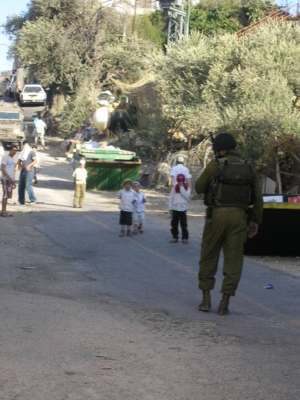 This morning, four internationals set
off to Qurtaba School to protect the children, while Luna
and I went up the hill to patrol another area of constant
settler violence. The police arrived after about 10
minutes. An officer I recognized from the day before
pointed at Luna and said "I'm arresting her now, she
knows she can't be here." We protested that the
Closed Military Zone order had expired and that we could
legally be there, but the officer threatened to arrest us
anyway. Luna warned him that if he arrested her
illegally she would call her lawyer and file a complaint
against him personally, and the police then got
significantly less aggressive. We tried to walk
away, and the officer yelled and ordered us to stay. We
waited while he talked on his radio, and then he said we
could go but warned that he would arrest us if he saw us
again.
This morning, four internationals set
off to Qurtaba School to protect the children, while Luna
and I went up the hill to patrol another area of constant
settler violence. The police arrived after about 10
minutes. An officer I recognized from the day before
pointed at Luna and said "I'm arresting her now, she
knows she can't be here." We protested that the
Closed Military Zone order had expired and that we could
legally be there, but the officer threatened to arrest us
anyway. Luna warned him that if he arrested her
illegally she would call her lawyer and file a complaint
against him personally, and the police then got
significantly less aggressive. We tried to walk
away, and the officer yelled and ordered us to stay. We
waited while he talked on his radio, and then he said we
could go but warned that he would arrest us if he saw us
again.
The four internationals at the school had also been
hassled, but the police admitted that there was no
current closure order but they were going to get one. By
9AM, they had the new closure order which they said was
good until 6PM tomorrow (normally they're only for 24
hours but this was a special one).
Meanwhile, teachers and students from Qurtaba School
refused to pass through the recently fortified Tel
Rumeida checkpoint. Palestinians entering Tel Rumeida
have been forced to pass through an armored trailer with
electric sliding doors and metal detectors for about two
weeks now. Fed up with the inconvenience and humiliation,
around 25 Palestinians demanded that they be allowed to
go around the checkpoint. Israeli soldiers said they'd
allow the children and four pregnant women to go around,
but not the others. The group decided they would not be
divided and all sat down and refused to leave until
school ended. School let out early because three armed
Israeli settlers parked outside the school in a pickup
truck, which terrified the young girls.
Three internationals decided to violate the new closure
order and join the teachers protest from the Tel Rumeida
side of the checkpoint, and to accompany them to school
if they got through. After around a half hour of threats,
the police finally arrested the three. They are currently
being held in the police station at Kiryat Arba
Settlement in Hebron.
12 September 2005
The three internationals were released this morning
without being taken before a judge. Israeli police said
they'd release them last night if they signed that they
would not return to Tel Rumeida, but the internationals
refused. They had set a court date for this morning at
10AM and ISM activists were prepared to attend the trial
in support. However, this morning our lawyer informed us
that the Israelis decided not to bother with a trial and
instead released the internationals without charges or
conditions.
We have been continuing street patrols, documentation and
outreach work. Israeli police and military harass us
frequently but have made no more arrests. They have
informed us about Closed Military Zone orders on the
neighborhood from time to time, but have not prevented us
from continuing our work. We consider this a success. We
will not let Israeli threats deter our solidarity, and
will continue to stand with Tel Rumeida Palestinians as
they resist Israeli colonization.
JOE CARR WOUNDED Press Oct.15th
Suddenly, we noticed
soldiers taking four Palestinian-looking men away to
jeeps. Several of us activists ran down the hill to make
sure the soldiers didn't mistreat those in their custody.
Turns out they weren't Palestinians being arrested, but
agent provocateurs being evacuated. They were Israeli
Special Forces placed there to provoke the shabab into
throwing stones.
While down with the soldiers, another activist and I
interfered with the soldiers firing rubber-coated bullets
at the shabab. We yelled at the soldiers to stop and
physically blocked their guns, a picture this appeared on
the cover of Al Quds (Jerusalem) Newspaper, a leading
Palestinian publication. The soldiers began pushing us
out of the area.
While an Israeli soldier held me from behind and pushed
me roughly, a large rock hurled from one of the Sheba's
slingshots struck me just below the ribs. I effectively
became a human shield for the soldier who would have
barely felt the stone through his flak jacket. The
soldier quickly pushed me away and I ran from the area to
avoid getting hit by any other rocks. Shabab quickly came
over to me and apologized and tried to help me up the
hill, but I insisted they stay and continue defending
their village. I quickly found the paramedics who treated
the flesh wound, and later took me to a
hospital in Ramallah.
X-rays determined that my ribs weren't cracked or broken
so I filled the prescription for an anti-inflammatory and
went back to the ISM flat to rest. I found myself in an
overwhelming amount of pain; I could barely breathe and
couldn't sit or stand up without almost fainting. After
about six hours of anguish, I went back to the hospital
and demanded they admit me and knock me out. Doped up on
plenty of Tramadole and an IV, I slept like a baby. The
next morning, an
ultra-sound located a rupture in my spleen and internal
bleeding. They thought it might heal on its own, but
after a day of continued bleeding they had to operate to
keep me from bleeding to death.
Palestinian surgeons were able to repair my spleen rather
than remove it, and the bleeding has stopped. They hope
I'll be out by next Saturday, so I'm set up with some
movies, my computer, and plenty of Palestinian and
international visitors. The medical care has been
excellent. The nurses are cheery, playful, and frequently
present. The doctor has been nice and frank, and even
called my parents. The Palestinian healthcare system is
mostly public, and this hospital is particularly known
for giving free care for those with Intifada-related
injuries. It's called the Al-Aqsa Martyrs Hospital, and
specializes in trauma. This probably means that I will
not be participating in demonstrations in Bil'in for a
while but I look forward to my next opportunity to
support Palestinian resistance to Israeli colonisation.
more
on Bi'lin
ISRAEL'S WALL DIVIDES PALESTINE
Bil'in villagers continued creative resistance
Tomorrow, Friday, October 14, 2005, Palestinian villagers
from Bil'in
will hold their weekly nonviolent protest against
Israel's planned
annexation wall, currently under construction on Bil'in's
land.
Joined by Israeli activists and internationals activists
from the
International Solidarity Movement, Bil'in villagers plan
to march to
the wall site with a giant Palestinian flag personified
with people's
heads. In the middle of the flag will be a mock barrier,
demonstrating
how Israel's wall is dividing Palestine. The Israeli
soldiers who
will be present to repress the demonstration, will be
made to appear as
if they are holding up the mock barrier.
Bil'in lies five kilometers East of the Green Line.
Israel's
planned wall route cuts deep into the West Bank, annexing
large
sections of Palestinian land to Israel and separating
Palestinians from
eachother. If completed, Israel will annex 60% of
Bil'in's
agricultural land to Modi'in Elite settlement, the
expansion for
which has not yet been officially approved by the Israeli
government.
For more information:
Muhammed 0545-851893
ISM media office 02-2971824
A landmark ruling in September, Israel's
Supreme Court ordered the army to tear down a section of
the barrier encircling the Jewish settlement of Alfei
Menashe and five Palestinian villages. The court said the
barrier can extend into the West Bank, but cannot impose
undue hardships on Palestinians. It asked that the loop
around the Palestinian villages be removed.
Residents of Bilin hope the ruling will help their case.
Some 575 acres in town - more than half of Bilin's land -
have been confiscated by Israel for a wide barrier loop
around the Jewish settlement of Kiryat Sefer, which is
rapidly expanding with hundreds of new housing units.
Bilin's initial Supreme Court appeal failed, but the
village of 1,700 has hired a new attorney and is
preparing for a second legal battle, said Abdullah Abu
Rahmi, a resident leading the fight.
On a recent Friday, three dozen Palestinians, Israelis
and foreigners marched from the mosque toward an olive
grove adjacent to the barrier, attempting unsuccessfully
to harvest olives. Some carried ladders, and children
held plastic buckets, using them as makeshift drums amid
chanting. Troops' loudspeakers warned that entering the
grove would be considered an "act of
aggression." A cat-and-mouse chase evolved into a
shouting match. Eventually, the sides tired of the weekly
ritual, and the bulldozers rumbled on. Construction of
the Bilin segment is nearly complete, with less than
three miles remaining. "We're hoping that if we
continue with the same determination and with the same
persistence, using peaceful means to resist, the courts
might also come under pressure," Abu Rahmi said.
Elsewhere along the route, Palestinians in the West Bank
farming village of Wadi Fukin, tucked into a valley next
to Israel's 1967 frontier, have banded together with
their neighbors in the Israeli town of Zur Hadassah to
try to stop construction. Wadi Fukin residents say their
livelihood is at stake. They rely on
six hilltop cisterns that feed an underground aquifer and
fear construction of the two-mile section of barrier
there will disturb irrigation. One cistern has already
dried out due to expansion in Beitar Illit, a nearby
Jewish settlement of some 26,000 residents, said Etai
Hovav, a Zur Hadassah geologist who is fighting the
barrier's route in court.
Israeli Foreign Ministry spokesman Mark Regev denied
Israel is unilaterally drawing a border. "We are
committed to negotiations by which the final border will
be agreed to between Israelis and Palestinians," he
said. Other officials, however, acknowledge that while
the barrier's route can change, it is likely to form the
point of reference in future negotiations.
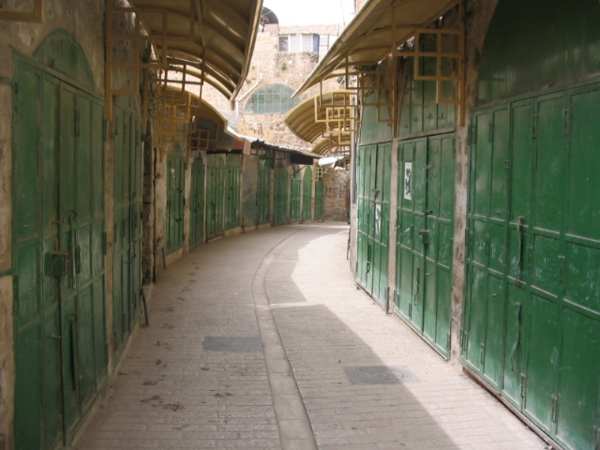
LIFE IN TEL RUMEIDA,
Chelli StanleyTel Rumeida Project
www.telrumeidaproject.org
Though each area of Palestine can be said to be unique,
Tel Rumeida is truly a world unto itself. Located in the
Israeli-controlled area of Hebron, Tel Rumeida is a small
neighborhood living out the brutal extravagance of direct
Israeli occupation. If Tel Rumeida is viewed as a
microcosm of the Israeli plan for Palestine, the
sometimes-subtle realities of Palestinian life under
occupation and the type of Palestinian state Israel
desires can be more easily comprehended.
Nearly every tactic used by Israel to create its
merciless occupation is employed in Tel Rumeida:
displacement, imprisonment, economic strangulation,
extreme militarization, arbitrary detention, land
confiscation, disruption of normal Palestinian life,
settler violence, soldier brutality, government
complicity with illegal settler acts, and daily
humiliation.
The Palestinian residents of Tel Rumeida never experience
living a normal day. The nearly three years of curfew
they have endured during this Intifada has permanently
scared the lives of every resident and the community
itself. The five soldier stations and recently modernized
electronic checkpoint located on three streets make it
nearly impossible for residents to walk anywhere
unhindered.
The two settlements, Beit Haddasseh and the Tel
Rumeida settlement, housing some of the West Bank's most
extreme settlers (including members of Kach, designated
by Israel as a terrorist organization,) and located at
the top and bottom of the Tel Rumeida neighborhood,
ensure that Palestinians living here will, at the very
least, have a daily reminder that they are no longer
welcome in their own neighborhood. The endless
abandoned homes and forcibly closed stores, many of them
sprayed with violently racist settler graffiti, do their
own part in contributing to the oppresive atmosphere of
the neighborhood. The living conditions in Tel Rumeida
are that of apartheid. Palestinians are not allowed to
drive their vehicles on the streets; they are for
Israelis only. Palestinian residents must carry or cart
everything to their homes while settlers take joyrides
through the neighborhood. Palestinians are forced to take
winding, dangerous, secondary paths to reach their houses
while Israeli settlers use the primary paths. Though the
Palestinian residents do not participate in the violence,
which is so unceasingly apparent in the neighborhood, it
is they who are stopped by the Israeli soldiers and
forced to lift their shirts and open their purses. Though
it is mainly the settler children, immune by law from
prosecution, who terrorize Palestinian children and
adults and who attack soldiers, it is the Palestinian
children who are constantly stopped, who have their
schoolbags searched, who are yelled at and hit by
soldiers. It is Palestinians who must wait in
lines to enter the electronic checkpoint every time they
enter or leave their community. It is Palestinians who
are harassed and humiliated by nearly every conceivable
variety of Israeli law enforcement official
as are in existence.
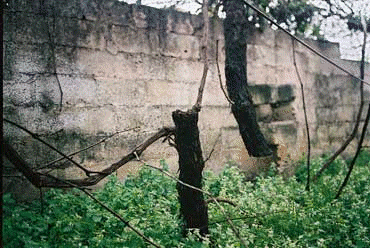
Israeli settlers rule Tel Rumeida. Young settler boys
saunter through the Tel Rumeida streets stoning or
attacking homes and Palestinian residents at will under
the indifferent eyes of Israeli soldiers and police.
Damaged and destroyed Palestinian homes, gardens, water
pipes, phone lines, and windows live as a testament to
the wrath of the settlers' former deeds. The absolute
impunity with which these settlers operate, combined with
their overt camaraderie with the Israeli soldiers and
policemen, are nothing less than a palpable message to
the Palestinian residents of the neighborhood that their
safety is not an Israeli concern.
Nearly every Palestinian resident of Tel Rumeida has a
disturbingly devastating story, such as that of a young
pregnant mother who has had two miscarriages in as many
years as a direct result of Israeli violence. Last year,
she was two months pregnant and, after Israeli soldiers
came inside her home and fired their weapons, was found
lying on the floor of her home, bleeding. She later lost
her child. This year, only a month ago, pregnant with
twins and home alone, seven
armed settlers screaming death threats attacked her
house. Soldiers stationed less than 30 meters from her
home did not respond to her calls for help during the
20-minute attack. Two hours later, lying again on the
floor of her home, she lost her first twin. Later in a
hospital operation, she lost the second. Since the death
of her twins, she has suffered from nervous attacks and
has been repeatedly hospitalized for collapsing.
The children of Tel Rumeida almost never play outside.
Those who do venture out run off the streets at the first
sound of an approaching settler vehicle and run into
their homes when groups of settlers walk by. Even the
youngest child of Tel Rumeida has learned indelible
lessons about the type of people their Israeli settler
neighbors are and their own place in the neighborhood,
acting out these lessons on a daily basis.
Tel Rumeida is one of the few areas in Palestine living
under direct Israeli occupation. The outcome of this
occupation is a brutalized Palestinian community,
economically devastated and imprisoned, living under the
endless violence of their Israeli neighbors. Tel Rumeida
is the Israeli occupation at large.
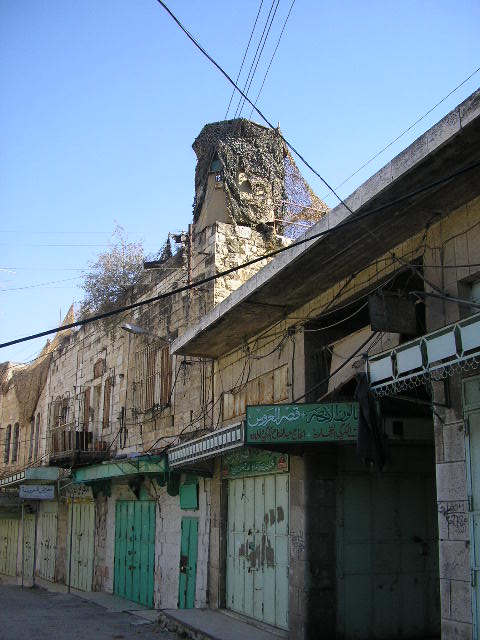
Hebron, the old part of the City now nearly abandoned.
The
city of Hebron 2 is surrounded with checkpoints, road
blocks and military barriers cutting roads leading to
other parts of the city in Hebron 1 and even to other
parts of Hebron 2 such as the industrial zone in Al
Fahs area. Farmers from around the city has no
access to the city's old markets, including the
vegetable market, gold market, yogurt market, leather
market and others.
September 1, 1998 To create more facts on the ground before the final status negotiations, the Israeli authorities installed 13 electronic gates in the old sector of Hebron city surrounding the Ibrahimi Mosque; thus, molesting the worshippers and violating the sanctity of the sacred place.
